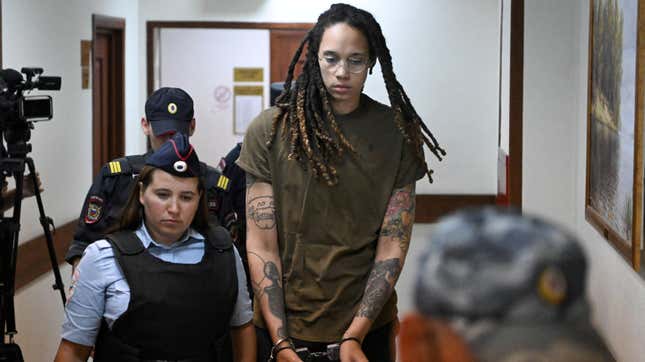Brittney Griner Sentenced to 9 Years in Russian Prison on Drug Smuggling Charges
President Joe Biden called the sentence "unacceptable" and reiterated Griner is being "wrongfully detained."
JusticePolitics

Brittney Griner’s month-long circus of a criminal trial has concluded, as a Russian court on Thursday found the basketball star guilty of an attempt to smuggle illegal drugs into Russia, according to her lawyers and the New York Times. She has been sentenced to 9 years in Russian prison.
Though shocking, a conviction of this nature and length has been predicted by legal experts familiar with the Russian justice system for months, calling the proceedings a “show trial” meant to drum up international outrage and attention. Griner had previously pleaded guilty not as an admission of guilt but as a tactic to move the trial along swiftly. A Russian prosecutor, according to the AP, had urged the court to convict and sentence the WNBA star to at least 9 ½ years in prison. Griner’s lawyers, meanwhile, appealed to the judge for leniency in her sentencing. The maximum sentence for cannabis, which is illegal in Russia, is 10 years in prison.
President Joe Biden, who’s proposed a prisoner swap with Russia for both Griner and former Marine Paul Whelan, called the sentence “unacceptable.”
Griner’s Russian legal team called the verdict “absolutely unreasonable,” according to the Times, and said “we will certainly file an appeal.” The team, part of the Moscow Legal Center, maintain the court had “completely ignored all the evidence of the defense, and most importantly, the guilty plea.”
-

-

-

-

-

-

-

-

-

-

-

-

-

-

-

-

-

-

-

-

-

-

-

-

-

-

-

-

-

-

-

-

-

-

-

-

-

-

-

-








































